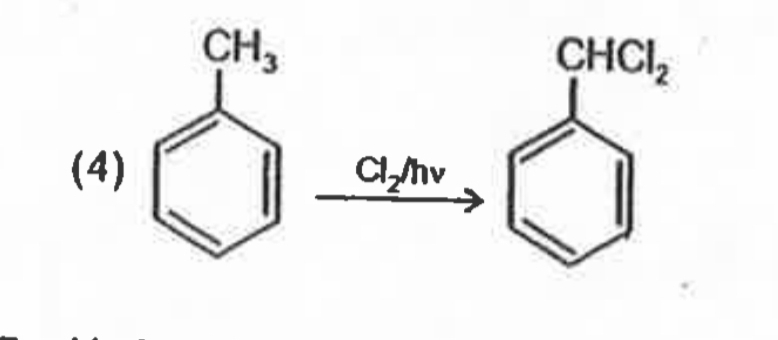Explain the following properties of carbon compounds with example :
(a) Oxidation reaction (b) Addition reaction
(c ) Substitution.
(a) Oxidation reaction. All the carbon compounds on complete oxidation give carbondioxide. On controlled or incomplete oxidation we get different products (depending upon starting compounds).
CH3CH2OHAcidified−−−−−→K2Cr2O7CH3COOH
(b) Addition reaction. Compounds of carbon, having double or triple bond show addition reactions.
CH2=CH2+HCl→CH3−CH2−Cl
CH≡CH+2HCl→CH3−CHCl2
(c ) Substitution reaction. Carbon compounds having single covalent bonds show substitutions reactions.
Topper's Solved these Questions
- BOOK - MBD -HARYANA BOARDCHAPTER - CARBON AND ITS COMPOUNDSEXERCISE - Short Answer Type Questions22videos
CARBON AND ITS COMPOUNDS
- BOOK - MBD -HARYANA BOARDCHAPTER - ACIDS, BASES AND SALTSEXERCISE - Long Answer Type Questions7videos
ACIDS, BASES AND SALTS
- BOOK - MBD -HARYANA BOARDCHAPTER - CHKHOICAL REACTIONS AND EQUATIONSEXERCISE - Example11videos
CHKHOICAL REACTIONS AND EQUATIONS
Similar Questions
Knowledge Check
- Question 1 - Select One
Which one of the following reaction is an example of free radical substitution reaction?
A B
B C
C D
D
- Question 2 - Select One
A characteristic reaction of compounds with a carbon-carbon double bond is an addition reaction. Addition reactions are
Ausually endothermicBusually exothermicCendothermic or exothermic depending upon the reagent addedDneither endothermic nor exothermic
Explain the following reactions with examples :
Oxidation reactionView SolutionExplain the given reactions with the examples.
(a) Hydrogenation reaction , (b) Oxidation reaction
(c ) Substitution reaction , (d) Saponification reaction
(e) Combustion reactionView SolutionExplain the given reactions with the examples.
(a) Hydrogenation reaction , (b) Oxidation reaction
(c ) Substitution reaction , (d) Saponification reaction
(e) Combustion reactionView SolutionExplain the following with examples :
(i) Tetravalency
(ii) Substitution reaction
(iii) Addition reaction
(iv) CombustionView SolutionGive the examples of substitution reactions.
View SolutionWhich one of the following reaction is an example of free radical substitution reaction?
View Solution
